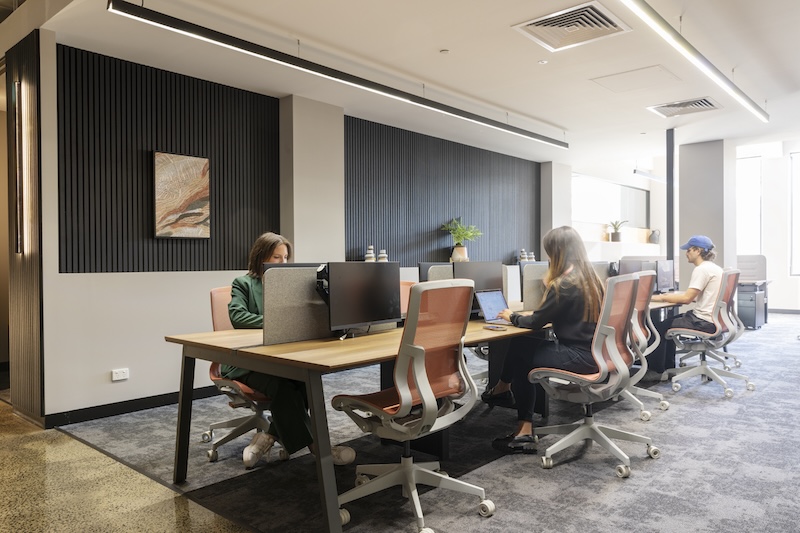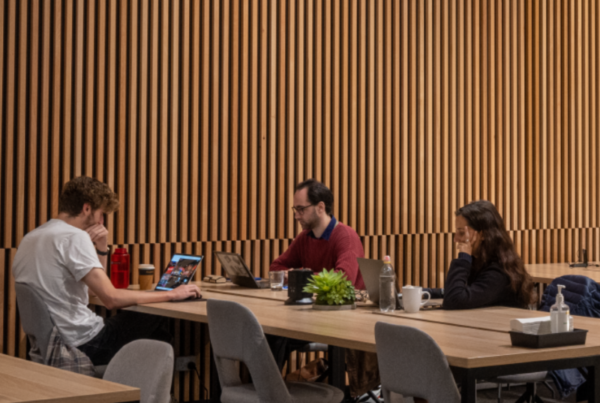
You may ask, are coworking spaces tax deductible in Australia? Well, tax deduction eligibility depends on the specific tax laws and regulations of each country. In the case of Australia, the deductibility of coworking space expenses can vary depending on several factors. The Australian Taxation Office (ATO) allows businesses to claim deductions for expenses. These are expenses that are incurred in the process of generating income.
If you operate a business and use a coworking space as your primary place of business or to conduct business activities, you may be eligible to claim a tax deduction for the expenses associated with the coworking space. These expenses can include rental fees, service charges, and other costs directly related to your use of the workspace.
Who is eligible to claim a tax deduction?
The eligibility to claim tax deductions depends on the specific expenses the tax-deductible amount incurred and the individual’s circumstances. Generally speaking, to be eligible for a tax deduction, the following criteria must be met:
Expense criteria
The expense or deduction being claimed must be incurred in the production or payment of assessable income, or it should be directly related to earning income. For example, the most common tax deduction expenses include work-related expenses, self-education expenses, investment expenses, and donations to eligible charities.
Documentation and substantiation
It’s important to keep proper records and documentation to support your claims. This includes receipts, invoices, and other expenses that prove the expenses were incurred. Failure to keep relevant documentation often results in declined claims.
Residency and income criteria
Individuals must be Australian residents for tax purposes. Non-residents may also be eligible for deductions related to Australian-sourced income. Additionally, the taxes claimed should not exceed the income earned during that tax year.
Compliance with tax laws
It’s crucial to comply with all relevant tax laws and regulations while claiming deductions. It’s advisable to consult with a qualified tax professional. You can also refer to the Australian Taxation Office (ATO) guidelines for specific information. This information is related to specific industries.
Overall, it is important to note that each deduction category may have specific eligibility requirements and limitations. Furthermore, you should most definitely consult with a tax professional or refer to the ATO website for detailed information about specific deductions and eligibility criteria.
What are the different types of tax deductions?
In Australia, there are various types of tax deductions that individuals and businesses can claim, subject to meeting certain criteria. Here are some of the most common types of tax deductions in Australia:
Work-related expenses
These deductions apply to expenses incurred in the course of performing your job or business, such as uniforms, equipment, tools, and work-related travel expenses. It’s important to ensure that these expenses are directly related to your work and not private.
Self-education expenses
You may be eligible to claim deductions for expenses related to self-education or professional development. These may include course fees, textbooks, and travel expenses. The education must be directly related to your current employment or a field in which you are employed or have the potential to be employed.
Investment expenses
If you have invested in income-producing assets, you may be able to claim deductions for expenses. These can be associated with managing and earning income from those investments. This can include interest on loans used to finance investments, investment property expenses, and financial advisor fees.
Donations to eligible charities
Donations made to registered charities and deductible gift recipients (DGRs) can be claimed as deductions. However, there are specific conditions and thresholds for different types of charitable donations, so it’s important to check the requirements set by the ATO.
Medical expenses
Some medical expenses may be eligible for tax deductions. However, the eligibility and conditions for claiming medical expense deductions have changed in recent years, and they are now limited to certain types of expenses and income thresholds. It’s advisable to refer to the ATO guidelines for specific details.
Office Space
If for example, you work from home, you may be eligible to claim deductions for home office expenses, including a portion of your rent or mortgage interest. Other expenses you may be eligible to claim may be utilities and home office equipment. However, specific conditions and record-keeping requirements apply to this.
In short, these are just a few examples of tax deductions available in Australia. It is important to consult with a tax professional or refer to the ATO guidelines to understand the specific eligibility criteria and limitations for each type of deduction.
Are coworking spaces tax deductible in Australia?
Are coworking spaces tax deductible in Australia? You may be able to claim tax deductions for coworking space rent expenses in Australia under certain circumstances. However, it’s important to note that tax laws can be quite complex, and it’s advisable to consult with a qualified accountant or tax professional or refer to professional advice from the Australian Taxation Office (ATO) for personalized advice.
If you use your own house, own room, office space, or a coworking space for work-related purposes regularly, you may be able to claim the expenses as a deduction.
Here are a few key points to consider:
Substantiation
You must be able to substantiate the expenses with proper records. These may include invoices or receipts, that clearly indicate the amount, date, and purpose of the expense.
Business use
The expenses must be directly related to your work and have a clear connection to the income you earn. Furthermore, if you use the coworking space for both personal and business purposes, you can only claim the portion that is attributable to your work activities.
Eligible expenses
Deductible expenses may include rental fees for the coworking space membership fees, and other costs directly associated with using the space for work purposes. However, expenses that are of a private or domestic nature are generally not deductible.
Self-employed or employee
The rules for claiming coworking space expenses may differ depending on whether you are self-employed or an employee. Self-employed individuals may have more flexibility in claiming these expenses, while employees might need to meet specific criteria to be eligible.
It’s important to keep in mind that tax laws and regulations can change. Therefore, it’s essential to consult the latest information from the ATO or seek professional tax advice. Ensure compliance with current regulations and determine if you are eligible to claim deductions for coworking space expenses.
Why are coworking spaces tax-efficient?
Coworking spaces can be tax efficient in Australia for some clients for various taxes and reasons:
Deductible Business Expense
When you use a coworking space for business purposes, the expenses incurred can be considered as deductible business expenses. This means that you may be able to claim these expenses as deductions when calculating your taxable income. By reducing your taxable income, you may potentially lower your overall tax liability.
Cost Allocation
When you use a coworking space, you typically pay a membership fee or rental fee for the workspace. These expenses can be allocated as business expenses, allowing you to claim a portion of the cost proportionate to your business use. This can be advantageous if you primarily use the coworking space for work-related activities.
Flexibility for Self-employed Individuals
Self-employed individuals, such as freelancers or independent contractors, often find coworking spaces beneficial as they provide a professional work environment without the commitment of a long-term lease. The ability to claim the expenses incurred in a coworking space as a tax deduction can help offset some of the costs associated with running a business.
Additional Deductible Expenses
In addition to the membership or rental fees, there may be other deductible expenses associated with using a coworking space. These may include costs related to internet access, office supplies, meeting room bookings, and other business-related services provided by the coworking space. These expenses can further reduce your taxable income.
It’s important to note that the specific tax efficiency of coworking spaces will depend on your individual circumstances, such as your business structure, the extent of your business use, and compliance with tax laws and regulations. As always, it is recommended to consult with a qualified tax professional or refer to the Australian Taxation Office (ATO) for more personalized advice regarding your specific situation.
How are coworking spaces profitable for business?
Coworking spaces generate revenue by renting out workspaces to individuals, freelancers, startups, small businesses, and even larger companies. By offering flexible membership options, such as daily passes, monthly memberships, or dedicated office spaces, coworking spaces can generate consistent rental income. This cost-sharing model enables businesses to access high-quality office spaces, meeting rooms, reception areas, and other shared resources. This is done at a fraction of the cost compared to setting up and maintaining their own dedicated offices. The shared cost structure helps reduce expenses for individual businesses and contributes to the profitability of the coworking space. By efficiently utilizing the available space, coworking spaces can generate higher revenue per square foot compared to traditional office setups where spaces may remain unused or underutilized for extended periods. Maximizing space utilization contributes to the profitability of the coworking space.
Many coworking spaces offer additional services beyond providing workspace, such as networking events, workshops, mentoring programs, business support services, and access to a community of professionals. These value-added services can attract more members and create additional revenue streams for the coworking space.
Scalability
Coworking spaces have the potential for scalability. As the demand for flexible workspaces continues to rise, coworking operators can expand their operations by opening new locations or expanding existing ones. This scalability allows them to serve a larger customer base and generate increased revenue.
It’s important to note that running a profitable coworking space requires effective management, a solid business model, understanding market demand, providing a desirable environment, and delivering quality services to attract and retain members. Successful coworking operators focus on creating a supportive and collaborative community while maintaining a sustainable financial model.
How Coworking Spaces Are Changing the Future of Work
Coworking spaces are having a significant impact on the future of work as the spaces cater to the growing demand for more hours, flexible work arrangements, and remote work. As technology advances and work becomes less tied to a desk and office, more individuals and businesses are embracing the freedom to work from anywhere. Coworking spaces provide a professional and productive environment outside of traditional offices and desks, allowing people to work independently or collaboratively as needed. You may want to ask questions like are coworking spaces tax deductible in Australia? How can you benefit from these incentives?
Do you know Why Coworking Spaces Are Becoming a Second Home?
Unique Collaboration
Coworking spaces foster a sense of community and collaboration. They bring together professionals from various industries and backgrounds, creating opportunities for networking, idea-sharing, and collaboration. By connecting like-minded individuals and businesses, coworking spaces promote innovation, knowledge exchange, and potential partnerships.
Entrepreneurship and Startups
Coworking spaces have become a hub for entrepreneurship and startups. They provide an affordable alternative to setting up a dedicated office, offering access to essential resources, mentorship, and a supportive community. Coworking spaces often host events, workshops, and programs specifically designed to support entrepreneurs, helping them launch and grow their businesses.
Do you think coworking spaces are only for startups and freelancers?
Work-Life Integration
Coworking spaces contribute to work-life integration by providing a flexible and balanced work environment. They often offer amenities such as on-site cafes, relaxation areas, fitness facilities, and social events, allowing individuals to combine work and personal activities more seamlessly. This shift from a traditional 9-to-5 office model to a more holistic work experience promotes overall well-being and work-life harmony.
Learn More about Work-Life in Coworking Space
Corporate Adaptation
Larger corporations are also embracing coworking spaces. They recognize the benefits of providing flexible workspace options for their employees, fostering innovation, and enabling collaboration with external partners or startups. Corporations are leveraging coworking spaces to create satellite offices, project-specific workspaces, or temporary locations for teams working on specific initiatives.
Sustainability and Cost Efficiency
Coworking spaces promote sustainability and cost efficiency. By sharing resources and optimizing space utilization, they reduce the environmental impact associated with traditional office setups. For individual businesses, coworking spaces offer cost savings. They eliminate the need for long-term leases, office setup costs, and maintenance expenses.
In summary, coworking spaces are transforming the future of work by reimagining the traditional office model, promoting flexibility, collaboration, and community. They cater to the changing needs and expectations of the workforce, driving innovation, entrepreneurship, and work-life integration in today’s dynamic and evolving work landscape.
Read our Latest Blog: Why is sustainability important in the workplace?
The Future of Work at United Co.
United Co. embraces the dynamic shifts in the modern workplace and recognizes the importance of flexibility, collaboration, and technological advancements. With the implementation of remote work options, flexible schedules, and state-of-the-art digital tools, United Co. empowers employees to thrive in an ever-evolving professional landscape. By fostering a culture of innovation and adaptability, United Co. positions itself as a forward-thinking organization, prepared to navigate the challenges and seize the opportunities of the future of work in Melbourne.

United Co.
425 Smith St.
Fitzroy VIC 3065
Melbourne, Australia
Wurundjeri Country




